|
|
|
Sort Order |
|
|
|
Items / Page
|
|
|
|
|
|
|
| Srl | Item |
| 1 |
ID:
126430
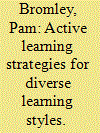

|
|
|
|
|
| Publication |
2013.
|
| Summary/Abstract |
Although political science instructors increasingly recognize the advantages of incorporating active learning activities into their teaching, simulations remain the discipline's most commonly used active learning method. While certainly a useful strategy, simulations are not the only way to bring active learning into classrooms. Indeed, because students have diverse learning styles-comprised of their discrete learning preferences-engaging them in a variety of ways is important. This article explores six active learning techniques: simulations, case studies, enhanced lectures, large group discussion, small group work, and in-class writing. Incorporating these activities into an introductory, writing-intensive seminar on globalization and surveying students about their engagement with course activities, I find that different activities appeal to students with different learning preferences and that simulations are not students most preferred activity. Bringing a broader range of active learning strategies into courses can improve teaching for all students, no matter their learning style.
|
|
|
|
|
|
|
|
|
|
|
|
|
|
|
|
| 2 |
ID:
187283
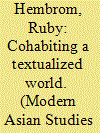

|
|
|
|
|
| Summary/Abstract |
Stories matter—writing them down matters. For indigenous (Adivasi) peoples from oral traditions, literature has become a way to maintain culture and keep it alive. This article too is a story—an investigative one—questioning and vocalizing the challenges we encounter in trying to articulate our realities and histories in a form that is new to us, one that we've been denied as a practice and one we are not believed we are entitled to use. Mainstream cultures have side-lined, overshadowed, and subjugated our knowledge systems, placing us in structures we have to traverse, and within which we have to exist, which is possible only by internalizing and mirroring others' or mainstream ways and languages to gain legitimacy as peoples or, worse, being branded and judged by their versions of narratives of us. This article plots the course of Adivasi histories and narratives enduring, outlasting, or being demolished by dislocation and dispossession, by dominant languages and cultures, and how both writing and orality are practices of both resistance and resurgence.
|
|
|
|
|
|
|
|
|
|
|
|
|
|
|
|
| 3 |
ID:
107958
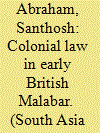

|
|
|
|
|
| Publication |
2011.
|
| Summary/Abstract |
This article examines the development of colonial law in Malabar between 1792 and 1810. Within the historical context of emerging colonialism as a pivotal factor, it shows that there was no simple unilinear process in the making of colonial law in this region of India, but rather a series of continuities and discontinuities of practices. A clear shift in the logic of governance is identified, however, as new technologies of power, particularly writing and documentation, resulted in several formalities of practices in the making of the colonial state and legal system in India.
|
|
|
|
|
|
|
|
|
|
|
|
|
|
|
|
| 4 |
ID:
182445
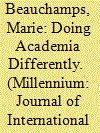

|
|
|
|
|
| Summary/Abstract |
In this article, I explore questions of pedagogy and knowledge-writing practices in their relation to knowledge production. Starting from the observation that different styles of writing are present in our work, but many of them are systematically pushed back and mis-read as non-academic, the article brings to the fore a discussion on the direct relationship between practices of knowledge-writing and those modes of knowing that escape the linear and propositional academic style while still being part of how knowledge comes into being. Following a tradition of intersectional feminist epistemologies, I engage with questions of epistemologies and critical pedagogies, speaking to and with several generations of scholars who address and work with questions of diversity and knowledge production that are seminal within International Relations (IR), yet underexplored from the perspective of knowledge-writing practices.
|
|
|
|
|
|
|
|
|
|
|
|
|
|
|
|
| 5 |
ID:
161397
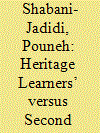

|
|
|
|
|
| Summary/Abstract |
This paper examines the acquisition particularities of advanced-level students. It also investigates the use of content-based—in this case media material—in teaching advanced-level students, as well as the impact of teaching such material on the students’ writing ability and overall proficiency. Finally, the subtle differences between heritage learners and second language learners are analyzed and discussed. Therefore, this research encompasses both a quantitative and a qualitative study of the issue at stake to ensure reliability of the findings. The results of the study suggest that there is no significant difference between the number of errors made by heritage learners and second language learners; however, the sources of these errors are often different. These sources of error and their possible reasons are discussed in this paper.
|
|
|
|
|
|
|
|
|
|
|
|
|
|
|
|
| 6 |
ID:
111968
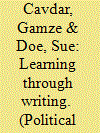

|
|
|
|
|
| Publication |
2012.
|
| Summary/Abstract |
Traditional writing assignments often fall short in addressing problems in college students' writing as too often these assignments fail to help students develop critical thinking skills and comprehension of course content. This article reports the use of a two-part (staged) writing assignment with postscript as a strategy for improving critical thinking in a lower-division political science course. We argue that through well-designed writing assignments, instructors can encourage students to reconsider concepts, critically evaluate assumptions, and undertake substantive revisions of their writing.
|
|
|
|
|
|
|
|
|
|
|
|
|
|
|
|
| 7 |
ID:
045251
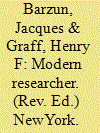

|
|
|
|
|
| Edition |
Rev. Ed.
|
| Publication |
NewYork, Harcourt, Bracs & World, Inc, 1970.
|
| Description |
xvii, 430p
|
| Standard Number |
0155625101
|
|
|
|
|
|
|
|
|
|
|
|
Copies: C:1/I:0,R:0,Q:0
Circulation
| Accession# | Call# | Current Location | Status | Policy | Location |
| 004882 | 001.4/BAR 004882 | Main | On Shelf | General | |
|
|
|
|
| 8 |
ID:
188732
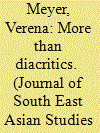

|
|
|
|
|
| Summary/Abstract |
The world, Fox shows in More than words, tends to be a lot more open-ended than we imagine, with more things in heaven and earth than are dreamt of, not just in our philosophy but also our philology. As a student of Javanese literature, I had encountered glimpses of this open-endedness on the pages of manuscripts where we sometimes find little dots on top of Javanese letters. These dots often appear in the literature of Islamic Java written in the carakan alphabet. Known to us as diacritics, they are used for originally Arabic words to produce sounds for which there is no letter in Javanese. Not all originally Arabic words get dots in Javanese texts: while a significant percentage of the Javanese vocabulary is adopted from Arabic, many words have become naturalised to the extent that their origin has become invisible. Sometimes, however, one does find dotted letters, marking words as somehow different from the other Javanese words around them. With Fox's analysis in More than words, I want to ask: how do we understand these dots? And what should we do with them?
|
|
|
|
|
|
|
|
|
|
|
|
|
|
|
|
| 9 |
ID:
143128
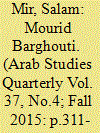

|
|
|
|
|
| Summary/Abstract |
Although the reputation of poet Mourid Barghouti (b. 1944) in the west rests on two personal memoirs, this article suggests that Barghouti's poetry deserves equal recognition. The long poem in Midnight and Other Poems (2005), the subject of this article, wrestles with the options of the modern exile. Suffused with memory, I argue that Midnight opens a creative window out of multiple historical sites and personal encounters that interrogates the notions of modernity and progress, victory and loss, and nationalism and patriotism. Out of political dilemmas emerge a beauty in words of resistance and defiance, “guns of mutiny” with deep ethical responsibility toward humanity. From within spiritual orphanage and alienation, Barghouti constructs clear, concrete poetry, an aesthetic that articulates the Palestinian memory, crossing borders of history, geography, and literary traditions. Midnight's tender poetic images reposition the Palestinian exile alongside other unique voices worldwide within memory studies.
|
|
|
|
|
|
|
|
|
|
|
|
|
|
|
|
| 10 |
ID:
122651
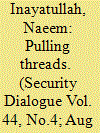

|
|
|
|
|
| Publication |
2013.
|
| Summary/Abstract |
The achievements of Elizabeth Dauphinee's (2013) The Politics of Exile are highlighted by means of two juxtapositions. First, Dauphinee's book invites a contrast to novels because it takes the form of a story. Specifically, Dauphinee's portrait of the vilified 'Serbs' is compared with how the Taliban are treated in Khalid Hosseini's The Kite Runner and Nadeem Aslam's The Wasted Vigil. Second, The Politics of Exile is examined as it emerges from Dauphinee's efforts to overcome the limits of her more academic work. The advantages of Dauphinee's approach relative to our standard research are presented along five dimensions: the responsibility of closure, the purpose of narration, the transparency of the message, how the work is shown, and the role of generosity. This article critiques Dauphinee's silence on the purpose of travel. It closes by suggesting what social theory can glean from The Politics of Exile. Social theorists can learn how to theorize more systematically, to weigh the relationship between the form and content in writing more judiciously, and to probe the deeper purposes of our intellectual life-work more fully.
|
|
|
|
|
|
|
|
|
|
|
|
|
|
|
|
| 11 |
ID:
086966
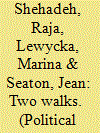

|
|
|
|
|
| Publication |
2009.
|
| Summary/Abstract |
In the summer of 2008 novelist Marina Lewycka and author and human rights lawyer Raja Shehadeh went on two walks: the first in Palestine near Ramallah near the Beit Eil Jewish settlement, the second on Kinder Scout in the Peak District, the site of the mass trespass in 1932 to reclaim the right to walk on the hills. This account of the conversation they recorded on the second walk includes observations by Marina on writing about Palestine and Israel and reflections by Raja about the effect of the Israeli occupation on the fragile Palestinian landscape. It also includes their discussions on writing, walking and the meaning it has to each of them, as well as political comments on the Israeli-Palestinian conflict evoked by visiting these sites. They wonder whether a similar act of resistance would be possible in Palestine and what it would mean to the future of the conflict.
|
|
|
|
|
|
|
|
|
|
|
|
|
|
|
|
| 12 |
ID:
092249
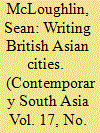

|
|
|
|
|
| Publication |
2009.
|
| Summary/Abstract |
This article reports in brief on an Arts and Humanities Research Council (AHRC) Diasporas, Migrations and Identities (DMI) programme funded network, 'Writing British-Asian Cities', which ran between 2006 and 2009. It contends that the diverse local configuration of Asian Britain has to a large extent remained unexamined in the literature. Having organised community-based events in five English cities, an indication is given of how London's East End, Bradford, Manchester, Birmingham and Leicester have all been 'written' and represented across a variety of genres since the 1960s. Bringing the perspectives of the social sciences into conversation with the arts and humanities, the network also prioritised further reflection on certain disciplinary perspectives and cross-cutting themes: history; literary/cultural production; religion; gender. Various working papers and other resources which report in more detail on the project are lodged on an interactive website, while a research group of the British Association of South Asian Studies (BASAS) has also been recently established.
|
|
|
|
|
|
|
|
|
|
|
|
|
|
|
|
|
|
|
|
|